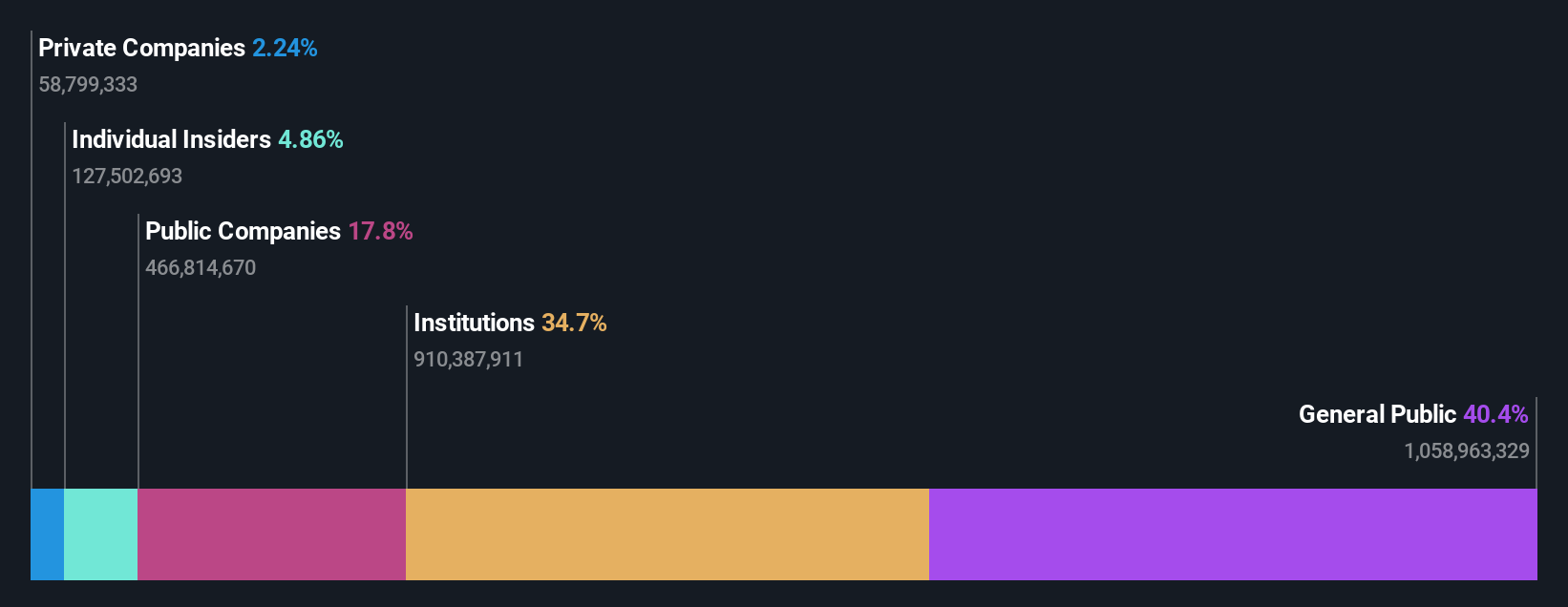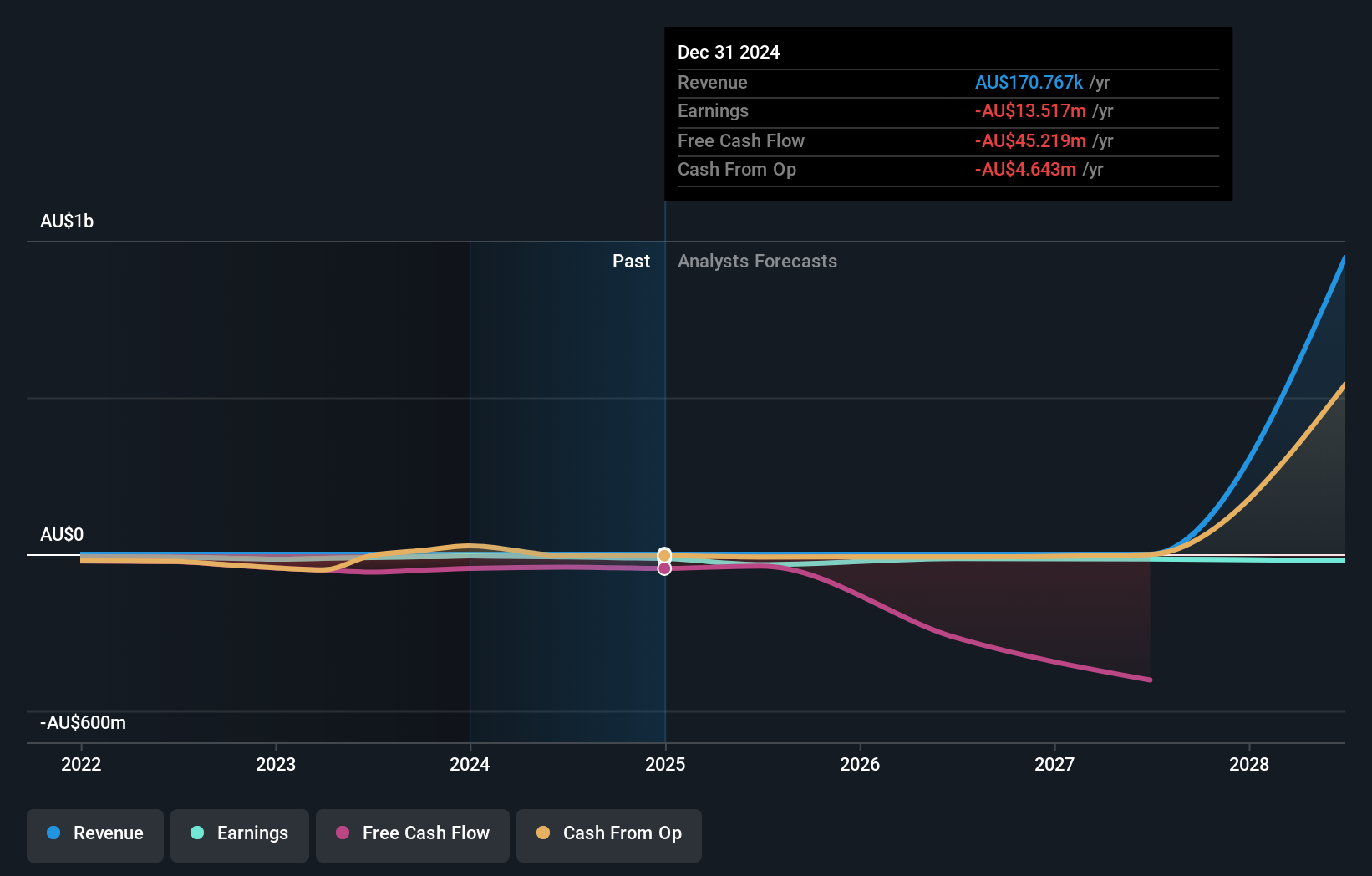- Australia
- /
- Metals and Mining
- /
- ASX:PDI
Predictive Discovery Limited's (ASX:PDI) 7.4% loss last week hit both individual investors who own 40% as well as institutions
Key Insights
- Significant control over Predictive Discovery by retail investors implies that the general public has more power to influence management and governance-related decisions
- 50% of the business is held by the top 8 shareholders
- Insiders have been buying lately
If you want to know who really controls Predictive Discovery Limited (ASX:PDI), then you'll have to look at the makeup of its share registry. And the group that holds the biggest piece of the pie are retail investors with 40% ownership. That is, the group stands to benefit the most if the stock rises (or lose the most if there is a downturn).
While institutions, who own 35% shares weren’t spared from last week’s AU$92m market cap drop, retail investors as a group suffered the maximum losses
Let's delve deeper into each type of owner of Predictive Discovery, beginning with the chart below.
See our latest analysis for Predictive Discovery

What Does The Institutional Ownership Tell Us About Predictive Discovery?
Many institutions measure their performance against an index that approximates the local market. So they usually pay more attention to companies that are included in major indices.
As you can see, institutional investors have a fair amount of stake in Predictive Discovery. This implies the analysts working for those institutions have looked at the stock and they like it. But just like anyone else, they could be wrong. If multiple institutions change their view on a stock at the same time, you could see the share price drop fast. It's therefore worth looking at Predictive Discovery's earnings history below. Of course, the future is what really matters.

We note that hedge funds don't have a meaningful investment in Predictive Discovery. Perseus Mining Limited is currently the company's largest shareholder with 18% of shares outstanding. Meanwhile, the second and third largest shareholders, hold 13% and 4.8%, of the shares outstanding, respectively.
We also observed that the top 8 shareholders account for more than half of the share register, with a few smaller shareholders to balance the interests of the larger ones to a certain extent.
While studying institutional ownership for a company can add value to your research, it is also a good practice to research analyst recommendations to get a deeper understand of a stock's expected performance. There are a reasonable number of analysts covering the stock, so it might be useful to find out their aggregate view on the future.
Insider Ownership Of Predictive Discovery
The definition of an insider can differ slightly between different countries, but members of the board of directors always count. Company management run the business, but the CEO will answer to the board, even if he or she is a member of it.
Insider ownership is positive when it signals leadership are thinking like the true owners of the company. However, high insider ownership can also give immense power to a small group within the company. This can be negative in some circumstances.
Shareholders would probably be interested to learn that insiders own shares in Predictive Discovery Limited. In their own names, insiders own AU$56m worth of stock in the AU$1.2b company. This shows at least some alignment. You can click here to see if those insiders have been buying or selling.
General Public Ownership
With a 40% ownership, the general public, mostly comprising of individual investors, have some degree of sway over Predictive Discovery. While this size of ownership may not be enough to sway a policy decision in their favour, they can still make a collective impact on company policies.
Public Company Ownership
It appears to us that public companies own 18% of Predictive Discovery. This may be a strategic interest and the two companies may have related business interests. It could be that they have de-merged. This holding is probably worth investigating further.
Next Steps:
While it is well worth considering the different groups that own a company, there are other factors that are even more important. Be aware that Predictive Discovery is showing 2 warning signs in our investment analysis , and 1 of those makes us a bit uncomfortable...
But ultimately it is the future, not the past, that will determine how well the owners of this business will do. Therefore we think it advisable to take a look at this free report showing whether analysts are predicting a brighter future.
NB: Figures in this article are calculated using data from the last twelve months, which refer to the 12-month period ending on the last date of the month the financial statement is dated. This may not be consistent with full year annual report figures.
New: Manage All Your Stock Portfolios in One Place
We've created the ultimate portfolio companion for stock investors, and it's free.
• Connect an unlimited number of Portfolios and see your total in one currency
• Be alerted to new Warning Signs or Risks via email or mobile
• Track the Fair Value of your stocks
Have feedback on this article? Concerned about the content? Get in touch with us directly. Alternatively, email editorial-team (at) simplywallst.com.
This article by Simply Wall St is general in nature. We provide commentary based on historical data and analyst forecasts only using an unbiased methodology and our articles are not intended to be financial advice. It does not constitute a recommendation to buy or sell any stock, and does not take account of your objectives, or your financial situation. We aim to bring you long-term focused analysis driven by fundamental data. Note that our analysis may not factor in the latest price-sensitive company announcements or qualitative material. Simply Wall St has no position in any stocks mentioned.
About ASX:PDI
Predictive Discovery
Explores for, identifies, and develops economic reserves in West Africa.
Flawless balance sheet with moderate growth potential.
Similar Companies
Market Insights
Community Narratives




